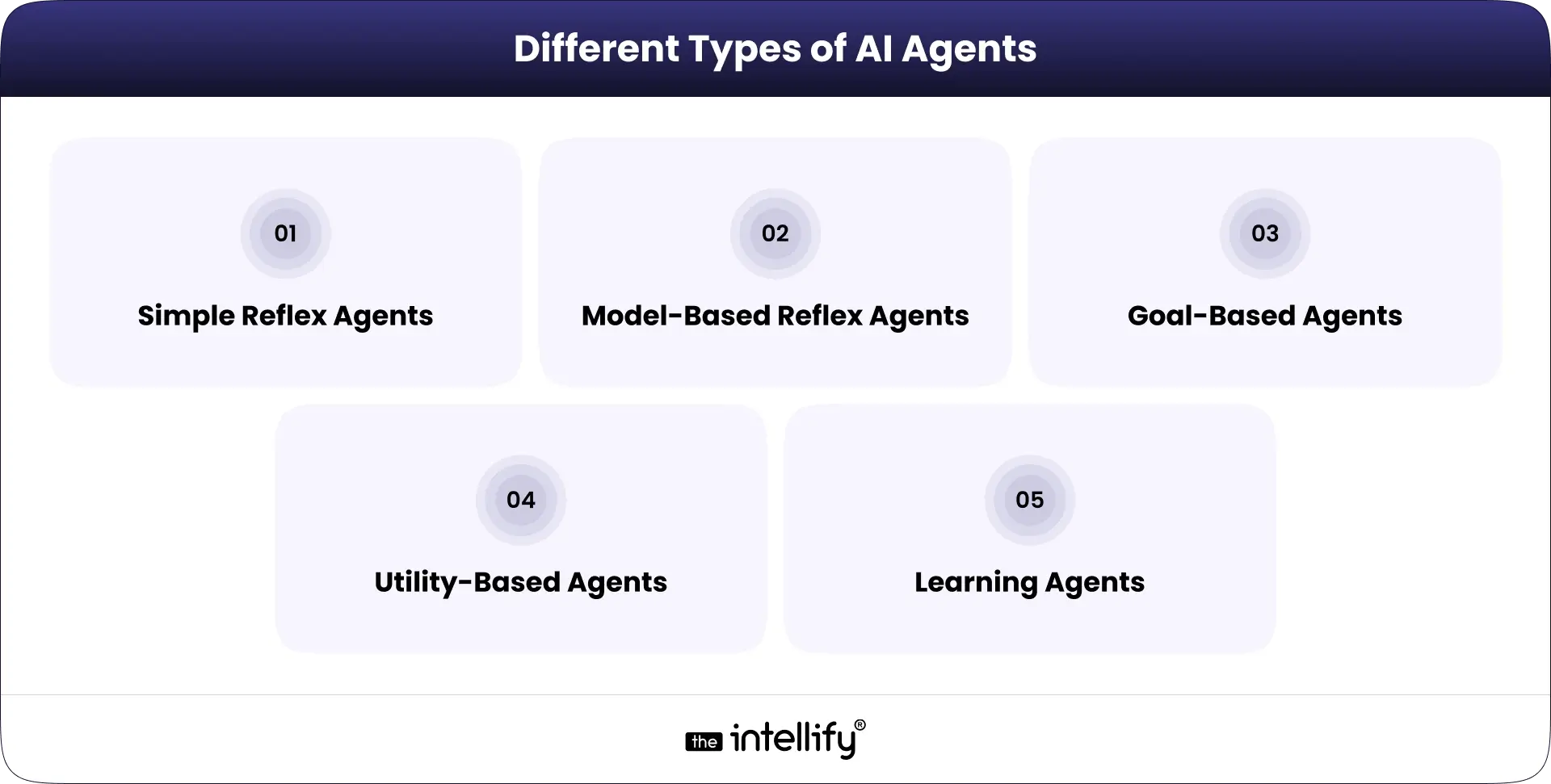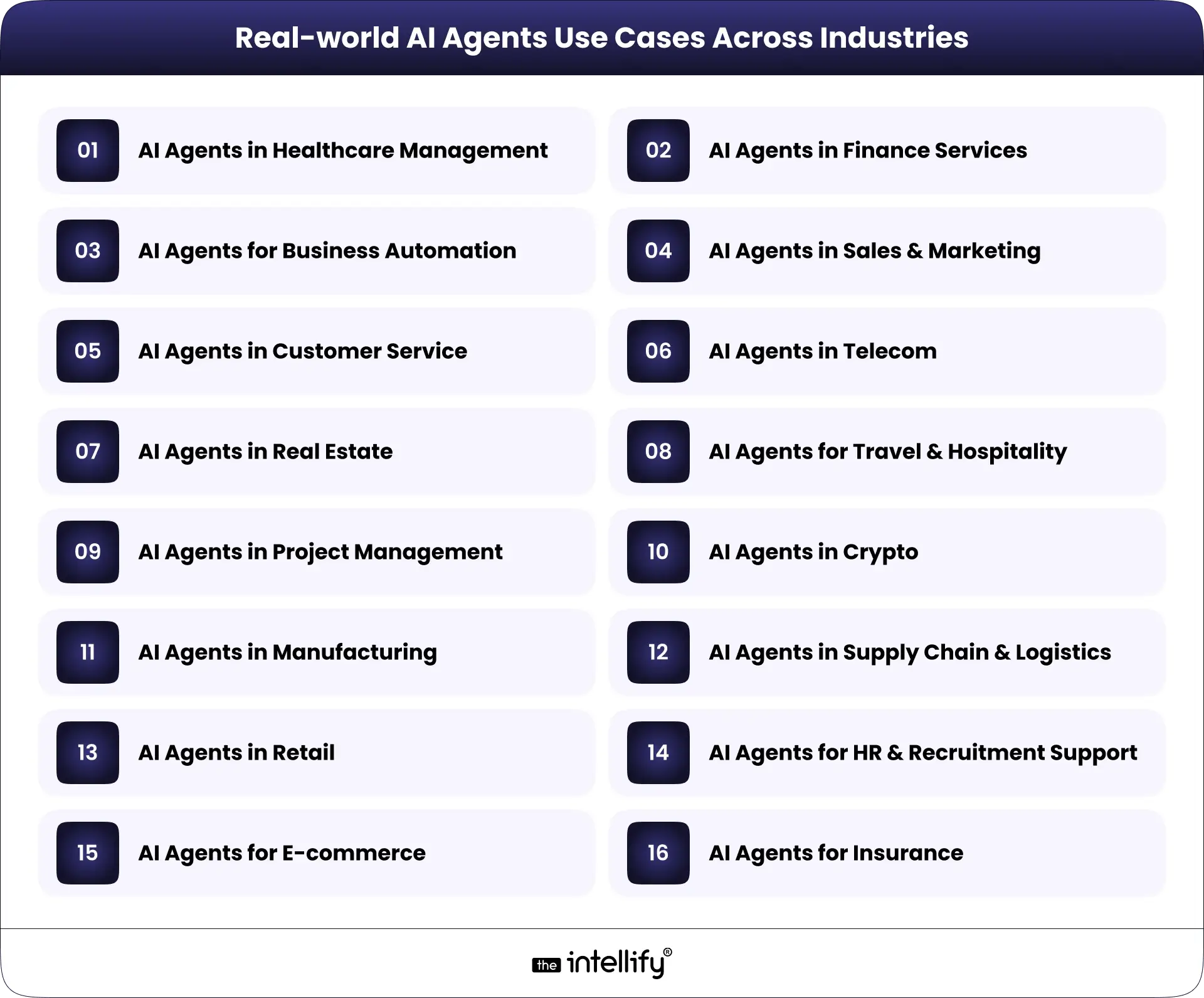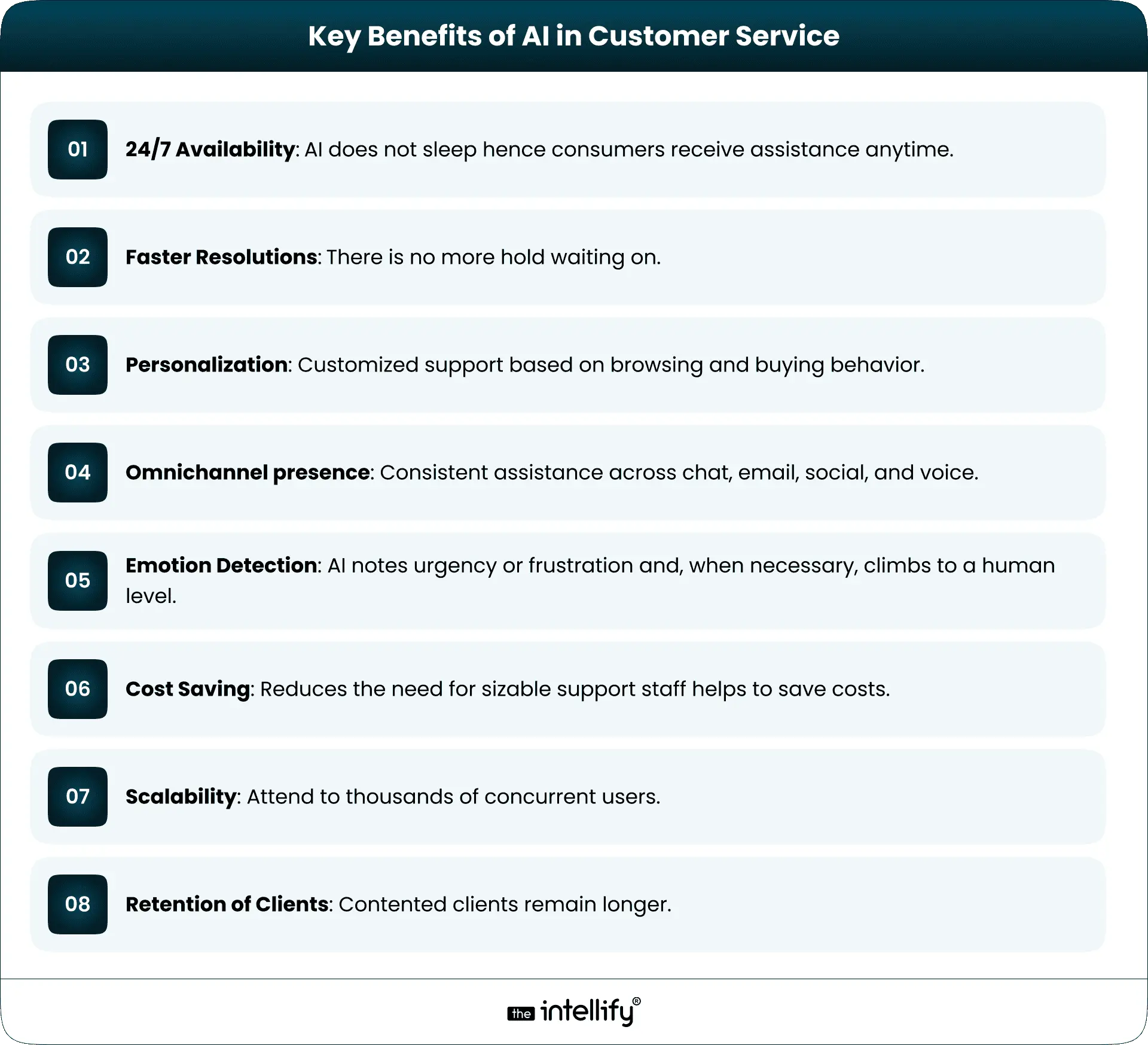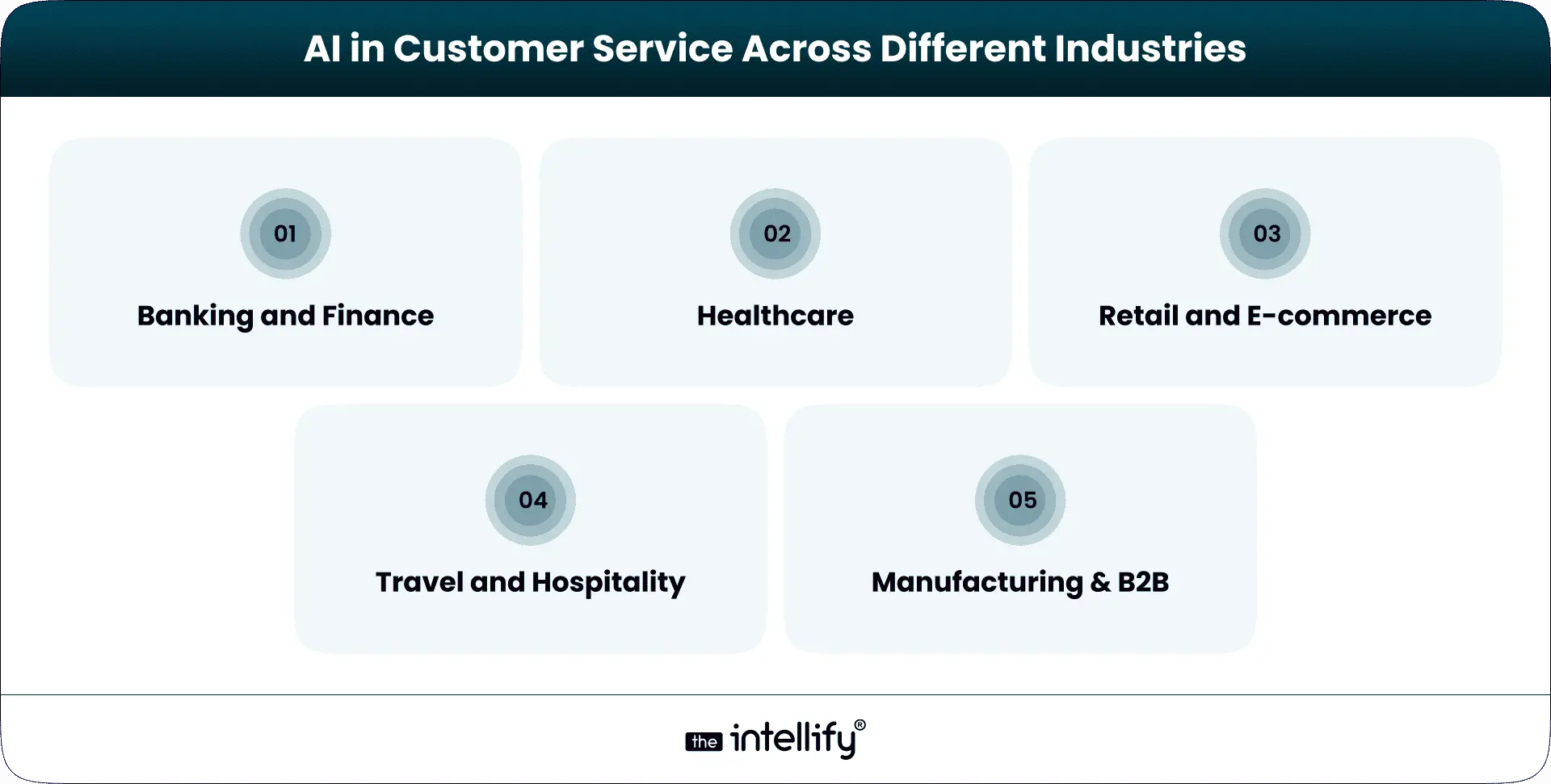AI Agent Overveiw
AI agents are no longer something that will happen in the future; they are already here, changing quickly, and making modern business work better in many fields. AI agents are helping businesses work smarter and more efficiently by automating customer service, managing finances, and changing the way things are made.
This blog goes into great detail about AI agents, including how they work, the different types, the top 15+ real-world business use cases across industries, the problems and benefits they bring, and how businesses can start their AI journey.
Different Types of AI Agents

AI agents are different from each other in how they take in information, make choices, and interact with the world around them. These are the main kinds of AI agents:
1. Simple Reflex Agents
- Do what you think is right based on what you see right now, without thinking about the bigger picture.
- Example: A basic chatbot that replies to specific keywords.
2. Model-Based Reflex Agents
- Use an internal model to make sense of the world and react based on what you’ve seen and heard in the past and present.
- Example: Virtual assistants tracking user preferences.
3. Goal-Based Agents
- Think about the different ways you can reach a certain goal and make a choice.
- Example: AI used in autonomous delivery planning.
4. Utility-Based Agents
- Look at a number of options and decide which one has the most expected utility (value).
- Example: AI can be used to set prices that change based on how many people want something.
5. Learning Agents
- Learn from data all the time and get better over time.
- Example: AI agents that adapt their performance through feedback loops.
How AI Agents Operates
AI agents interact with their surroundings, collect information, understand it, and then make smart choices or suggestions. This is how the main features usually work:
- Perception: Agents use sensors or APIs (like customer messages or sales trends) to get information.
- Decision-Making: Agents decide what to do next based on programmed logic or trained ML models.
- Action: They do things like answer a question, update records, or let a person know.
- Learning: Advanced agents change based on how well they do, what users say, or new information.
Some of the technologies that make AI agents possible are:
- Machine Learning (ML)
- NLP, or Natural Language Processing
- RPA, or Robotic Process Automation
- Learning Deep
- Vision for Computers
Use Cases of AI Agents in Business
AI agents are deployed across industries, improving efficiency, productivity, and user satisfaction. Here are 15+ practical and powerful use cases:

1. AI Agents in Healthcare Management
Healthcare providers use AI agents for better patient engagement, predictive diagnostics, and operational efficiency.
- Virtual assistants for appointment scheduling and medication reminders
- Predictive AI for disease diagnosis
- Remote monitoring of patient vitals via smart AI agents
- NLP-based chatbots answering medical queries
These AI agents in healthcare reduce administrative workload and improve patient experiences.
Example: AI agents like Babylon Health help in triage, virtual consultations, and reducing hospital visits.
2. AI Agents in Financial Services
Banks, insurance companies, and fintech platforms leverage AI agents for fraud detection, credit risk analysis, customer service, and investment advice.
- Real-time anomaly detection to flag suspicious transactions
- Chatbots for 24/7 banking support
- Robo-advisors offering customized investment portfolios
- Loan approval automation based on financial history and risk score
Example: AI agents in PayPal help flag fraudulent transactions faster than traditional systems.
3. AI Agents for Business Process Automation
Companies are automating repetitive internal workflows using AI agents to reduce human errors and save time.
- Invoice processing bots
- Automated report generation
- Smart document classification and tagging
- Workflow management across HR, finance, and procurement
Key benefits: Increased productivity, faster turnaround time, and cost reduction.
4. AI Agents in Sales & Marketing
Marketing teams deploy AI agents for data-driven insights and hyper-personalized campaigns.
- AI for customer segmentation and targeting
- Predictive analytics for lead scoring
- Automated email and SMS campaigns
- Content personalization based on user behavior
Sales teams use AI for pipeline forecasting and conversational selling via AI-powered assistants.
Example: Drift and Conversica’s AI sales agents improve follow-ups and conversion rates.
5. AI Agents in Customer Service
Customer service is one of the most mature use cases for AI agents. With the rise of AI voice agents, businesses provide 24/7 multilingual support.
- AI voice bots answering common customer questions
- Omnichannel AI chatbots on websites, social media, and apps
- Smart ticket categorization and routing
- Sentiment analysis for customer mood detection
These agents drastically reduce wait times and improve satisfaction.
6. AI Agents in Telecom
The telecom sector uses AI agents to streamline network management and improve service reliability.
- Predictive maintenance of telecom infrastructure
- Smart agents resolving technical queries
- Billing automation and fraud detection
- Personalized plan recommendations for users
Example: Vodafone uses AI agents for customer complaint resolution.
7. AI Agents in Real Estate
Real estate firms are adopting AI agents for client engagement and operational insights.
- AI chatbots responding to property inquiries
- Smart agents scheduling property tours
- AI for property valuation based on real-time market data
- Intelligent CRM integrations for lead nurturing
Key benefit: Streamlined sales funnel and improved customer interaction.
8. AI Agents for Travel & Hospitality
AI is reshaping how travelers book, plan, and experience travel.
- Travel booking assistants
- AI chatbots offering multilingual support
- AI-curated travel itineraries based on preferences
- Price tracking and alerts
Example: Expedia uses AI to automate travel booking and suggestions.
9. AI Agents in Project Management
AI agents optimize project delivery, reduce risks, and improve collaboration.
- Automated task assignment and scheduling
- Time tracking bots
- Risk prediction and mitigation alerts
- AI assistants summarizing project status updates
Benefit: Managers can focus on strategy while agents handle routine coordination.
10. AI Agents in Crypto
Crypto AI agents assist investors in analyzing volatile markets and automating transactions.
- Real-time trading bots
- Market sentiment analysis from social data
- Crypto portfolio rebalancing tools
- NFT value prediction models
Example: 3Commas and Pionex offer AI crypto bots for trading optimization.
11. AI Agents in Manufacturing
Manufacturers use AI agents to increase uptime, reduce waste, and streamline processes.
- Predictive maintenance of machinery
- Real-time quality control and defect detection
- Production scheduling optimization
- AI-powered safety monitoring systems
Result: Reduced downtime, improved product quality, and higher ROI.
12. AI Agents in Supply Chain & Logistics
These agents bring agility and efficiency across supply networks.
- Inventory prediction and replenishment bots
- Route optimization for logistics
- Warehouse automation with vision-enabled robots
- AI for demand forecasting
Example: DHL uses AI to optimize delivery routes and customer communication.
13. AI Agents in Retail
AI agents transform the shopping experience, both online and in-store.
- Personalized product recommendations
- Virtual try-on AI assistants (clothing, makeup, eyewear)
- In-store navigation bots
- AI-powered visual search
Example: Sephora uses virtual assistants for product selection and virtual try-ons.
14. AI Agents for HR & Recruitment Support
HR departments leverage AI for better talent management and employee satisfaction.
- Resume screening bots
- Virtual agents for employee onboarding and offboarding
- Leave application and tracking agents
- Company policy and benefits information retrieval
Example: Alris AI simplifies employee onboarding and policy retrieval through a conversational interface like Agentic AI & chatbots which eases HR workload.
Result: More efficient hiring and improved employee experience.
15. AI Agents for E-commerce
Online retailers use AI to boost conversions, retention, and experience.
- Smart chatbots for product discovery
- Cart abandonment recovery agents
- Voice shopping assistants
- Dynamic pricing optimization
Benefit: Higher conversion rates and better customer satisfaction.
16. AI Agents in Insurance
The insurance industry is digitizing processes with AI.
- AI agents for claim intakes and validation
- Fraud detection bots
- AI for underwriting and risk analysis
- Virtual policy assistants
Example: Lemonade uses AI agents for instant claims approval and customer support.

Challenges of Adopting AI Agents
- Data Privacy and Security: Making sure that customer data is safe.
- Bias in Algorithms means that biased data can lead to outcomes that are not fair or useful.
- High Initial Costs: Making custom AI can cost a lot of money.
- Integration Complexities: making sure it works with the tech stacks that are already in place.
- Change Management: Teaching workers and changing the culture.
Real-World Examples – Case Studies
Alris AI: Alris AI is a smart AI platform that helps HR teams with onboarding, leave requests, IT support, and questions about company policies to make the experience better for employees.
AirAsia: Uses AI agents to help with booking, ticketing in multiple languages, and real-time updates, which cuts down on the time customers have to wait.
HDFC Bank used AI voice bots to answer more than half of customer questions, which sped up service and cut costs.
Amazon uses AI agents to make smart product suggestions, automate warehouses, and plan deliveries.
The Future of AI Agents

AI agents are getting better at talking to people, being independent, and changing. Important trends that will shape the future:
- Multimodal AI Agents: Able to handle text, voice, pictures, and videos as inputs
- Agent Collaboration: When several agents work together to reach a difficult goal
- Human-in-the-loop AI: Using AI to make things faster while still using human knowledge
- Domain-Specific Agents: Made for fields like law, farming, and education
As more people use AI, it will be built into all business software and user interactions.
How to Invest in AI Agents?
- Identify Use Cases: Start with a high-impact area like sales or support.
- Use No-Code or Low-Code Platforms to make deployment faster with little work.
- Pilot First: Do a pilot program before you grow.
- Work with AI Development Experts: Find a reliable company to help you make solutions that are just right for you.
Looking for an AI Agent Development Company?
The Intellify is a leading AI agent development company that helps startups and enterprises build intelligent digital assistants and agents. From AI voice bots to advanced autonomous systems we deliver custom solutions tailored to your business goals.
- Experienced in multiple industries
- Proven track record in AI automation
- Scalable, secure, and future-ready solutions
Last Thoughts
AI agents are more than just software; they are digital coworkers that help make better decisions and run things more smoothly. Companies that put money into AI agents now will have an advantage over their competitors, be more productive, and be better ready for the changing business world of the future.
AI agents can make every part of your business work better, whether it’s HR, sales, manufacturing, or customer service. Work with professionals like The Intellify to create AI-powered systems that are always available for your business.








